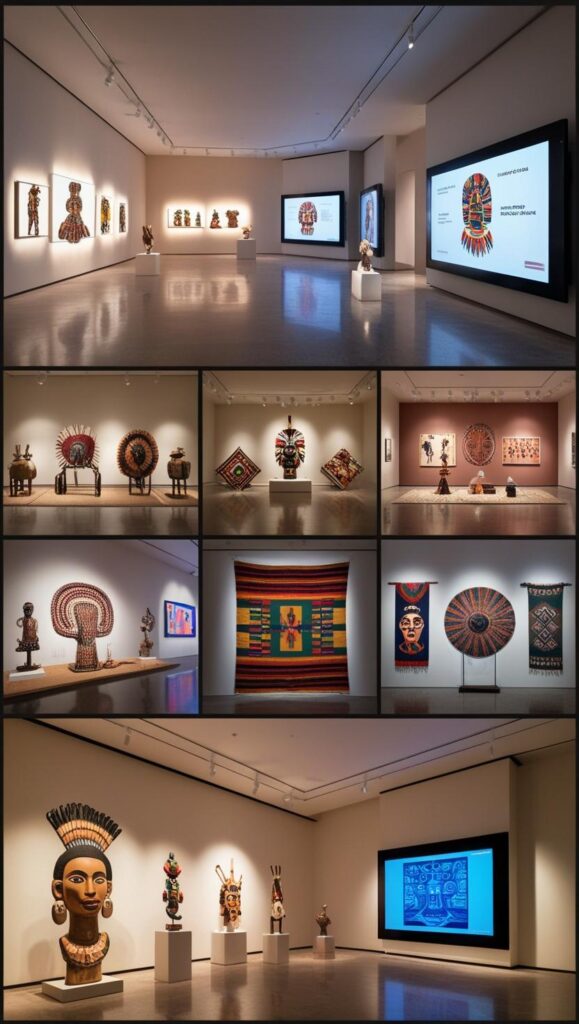Decolonial curation proposes a critical review of traditional museum practices, seeking to dismantle the colonial legacies that have shaped the production and dissemination of knowledge within these institutions. This effort aims to make museum spaces more inclusive, representative, and equitable, ensuring that multiple voices and perspectives are incorporated into the construction of historical and cultural narratives.
Fundamental Principles of Decolonial Curation
Decolonial curation questions the centrality of Western epistemologies and advocates for including alternative ways of knowing, particularly those from historically marginalized peoples. The direct involvement of communities in the management and interpretation of collections is one of the core principles of this approach. Shared authority in the curatorial process allows the bearers of the represented cultures to actively contribute to constructing exhibitions and discourses.
The appreciation of multiple epistemologies broadens the understanding of objects and the histories preserved by museums. Indigenous knowledge systems, oral narratives, and other forms of knowledge transmission must be recognized as legitimate sources of information. Diversifying the adopted references helps to break with the homogenization of the histories presented to the public.
Decolonial curation also requires collaborative and relational practices. Continuous and respectful engagement with local communities and historically underrepresented groups ensures that museums become spaces of exchange, dialogue, and historical repair. This approach is not limited to displaying new narratives but involves a structural transformation of museum institutions to make them more accessible and just.
Challenges of Decolonial Curation
Implementing decolonial curation faces significant challenges. Museums, historically structured as instruments of colonial power, were designed to preserve and display objects within a Eurocentric model of knowledge. Dismantling this logic requires profound changes in both how collections are organized and how institutions are governed.
One of the central challenges lies in institutional resistance. Many cultural institutions still operate within a consolidated hierarchical structure where decisions are made without proper consultation with the involved communities. Changing this dynamic requires efforts to include new voices in curatorial processes, redistributing power, and promoting greater transparency in collection management.
The repatriation of objects acquired in colonial contexts represents another critical challenge. Many pieces held in Western museums were removed from their original contexts without the consent of the originating communities. The restitution of these cultural assets faces legal, political, and institutional barriers but is an essential step toward correcting historical injustices and restoring cultural connections disrupted by colonization.
The revision of museological narratives is also a pressing challenge. Many exhibitions still reinforce a unilateral perspective, in which the history of colonized populations is told from a Western viewpoint. Reinterpreting collections requires incorporating multiple perspectives, allowing different versions of history to be presented equitably.
Rethinking Colonial Legacies in Museums
Museums carry colonial legacies that need to be reevaluated to become more ethical and representative social institutions. Some of these legacies include cultural hierarchization, how collections were acquired, and the exclusion of non-Western epistemologies.
The display of non-Western cultures through a Eurocentric perspective perpetuates historical inequalities and reinforces the notion that certain traditions are inferior. The challenge of decolonial curation is to reframe these collections and ensure they are presented from the perspectives of the represented peoples themselves.
The acquisition of objects during the colonial period often occurred through coercion, looting, or unequal transactions. Rethinking this legacy involves not only the restitution of cultural assets but also the creation of new collection management policies that respect the rights of originating communities and prevent new forms of appropriation.
The power structures governing museums also reflect colonial logic, concentrating authority in the hands of specialists and administrators without space for the active participation of the involved communities. Democratizing these institutions requires changes in decision-making processes, ensuring that historically marginalized voices have real influence in shaping narratives and institutional policies.
The language used in exhibitions and educational materials must be revised to avoid stereotypes and biases inherited from colonialism. The vocabulary employed in describing objects and cultures should respect how these societies self-identify, abandoning derogatory and inaccurate terminologies.
Accessibility and inclusion are essential challenges for the transformation of museums. Promoting initiatives that make collections understandable to diverse audiences, including communities historically distanced from these spaces, contributes to strengthening the social role of museums as spaces for knowledge and intercultural dialogue.
The notion of museum neutrality needs to be deconstructed. Curatorial choices, the way objects are presented, and the stories told reflect political and ideological positions. Recognizing this reality allows museums to commit more transparently to social justice and cultural diversity.
Conclusion
Decolonial curation proposes a profound transformation of museums, making them spaces of resistance, repair, and inclusion. The challenge is not limited to incorporating new narratives but involves a structural review of institutional practices, from collection management to relationships with represented communities. Rethinking colonial legacies, democratizing knowledge production, and creating space for multiple ways of knowing are fundamental steps toward building more equitable and socially responsible museums.

